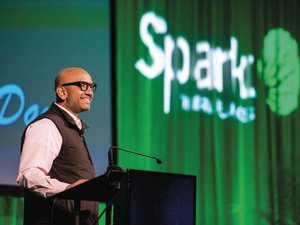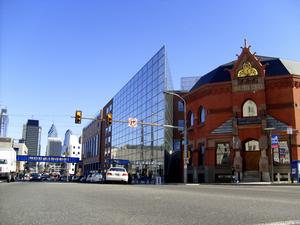
Drexel University's first investments in its newly launched Innovation Fund are in two climate-focused, university-affiliated startups.
GrowFlux and SusMax both received investments of $150,000 each. Drexel launched the Innovation Fund in January and will supply annual funding for up to four startups that are founded by faculty, students or alumni.
GrowFlux was founded by two alums of Drexel's College of Engineering, while SusMax was launched by a team of one alum and a professor of the engineering school.
GrowFlux makes devices that can control agricultural lighting and preserve energy. It was founded by Eric Eisele and Alex Roscoe who graduated from Drexel in 2009 and 2013, respectively. Farms often employ lighting, typically LED lights, in greenhouses, in livestock shelters and other controlled environments as a catalyst for production and replacement for natural light. GrowFlux — founded in 2017 as a maker of LED lights — shifted in 2020 to create devices that can control agricultural lighting at scale.
Based in Drexel and the University City Science Center's ic@3401 incubation space, Growflux won the Philadelphia Alliance for Capital and Technologies' pitch competition in 2022. A year earlier, it received a $250,000 grant from the Wells Fargo Innovation Incubator and the U.S. Department of Energy’s National Renewable Energy Laboratory.
Similarly, SusMax is looking to bring climate-friendly technology to a traditionally blue-collar industry. The Drexel spinout was founded by Mo Balapour, who received a master's in 2019 and doctorate in 2021 from Drexel, along with university professor Amir Farnam. The company recycles coal waste to create a new lightweight concrete material that can be used in construction. The material, Spora, can be used in concrete masonry, green roofs or water filtration systems while keeping waste out of landfills.
Due to Spora's lightweight nature, Balapour said the technology can increase the life of concrete by 20% and reduce carbon emissions associated with the transportation of materials by 50%. Founded in 2020, SusMax last year took part in the Heritage Group Accelerator, which was also accompanied with a grant of $150,000. It received a $256,000 grant from the National Science Foundation in 2021. It also won Drexel's Startup Fund Competition, which included a $25,000 prize. The startup is based at ic@3401 as well.
In launching the Innovation Fund in January, Drexel President John Fry said he was "doubling down" on the school's investment into innovation. The fund was created to provide capital to early-stage startups and as a way to commercialize research coming out of Drexel. The university has committed to funding a portion of the program for five years and it will look to gifts from donors to meet a goal of raising $5 million for the fund.







